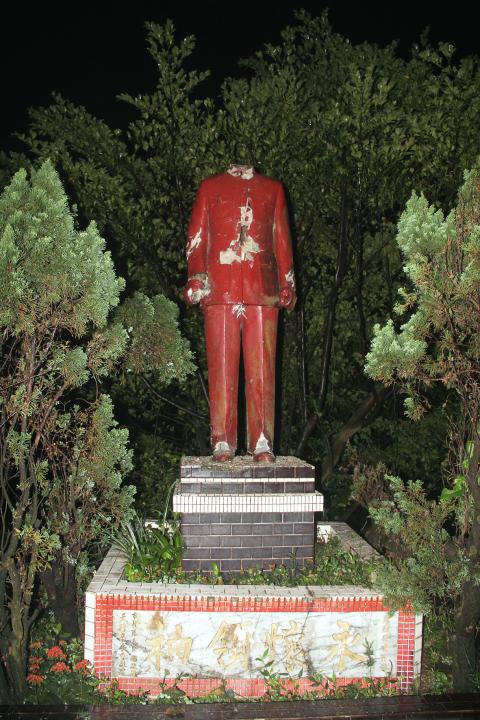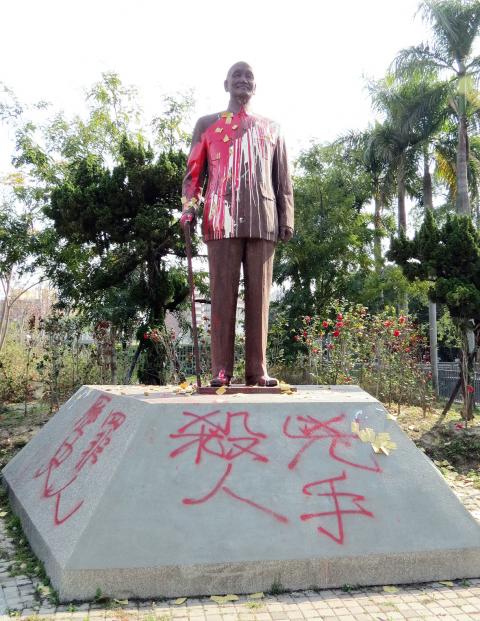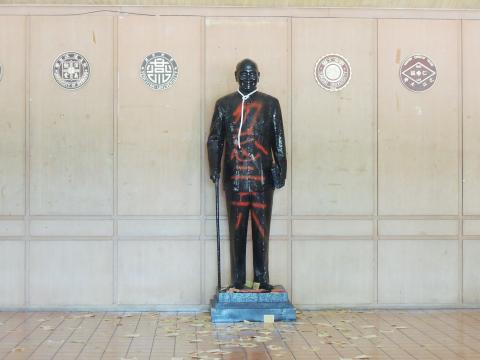An unusually high number of protests targeting statues of former president Chiang Kai-shek (蔣介石) have been reported across the nation in the wake of the 68th anniversary of the 228 Incident on Saturday.
A statue of Chiang erected in Taichung City’s Jhongjheng Park (中正公園) was found yesterday morning covered with white and red paint as well as ghost money, with the Chinese characters for “killer” and “villain” spray-painted on its pedestal.
Police said it was the second defacement of the stone statue in two days. On Saturday morning, it was discovered with the Chinese character for “murderer” spray-painted on its base. City workers removed the graffiti later that day.

Photo: Wu Cheng-feng, Taipei Times
Taichung’s Construction Bureau director Huang Yu-lin (黃玉霖) said the agency has teamed up with the city’s Education Bureau in investigating if other statues of Chiang have been vandalized.
The city government said that just four of the city’s approximately 400 parks have statues of Chiang and that it would consider whether to keep or relocate them once the investigation has been concluded.
It said no charges would be filed against whoever is responsible, as the spray-painted slogans are considered to be equivalent to stains, but that police presence in the areas involved would be increased.

Photo: Chang Ching-ya, Taipei Times
Meanwhile, in northern Taiwan, a beheaded statue of Chiang depicted in two photographs posted on a Facebook page titled “Indefinite Support to Art Installations Featuring Chiang” (無限期支持—全台裝置藝術蔣) on Saturday has been confirmed to be located in a park in Keelung.
Investigators said the fiberglass-based statue’s head was smashed to pieces, and the statue’s torso and ankles were damaged. They added that the perpetrators apparently attempted to knock the sculpture down before realizing that its legs are made of steel and concrete.
Statues of Chiang erected within Taoyuan’s Jhongjheng Park and in front of the Taoyuan Railway Station were also vandalized.

Photo: Tsai Shu-yuan, Taipei Times
In addition, sculptures of Chiang on campuses nationwide have been defaced over the past few days, including ones at Taipei First Girls’ High School, Taipei Municipal Daan Vocational High School, National Chutung Senior High School, Tunghai University and National Taipei University of Technology.
Tunghai University chief secretary Lu Ping-kuan (呂炳寬) said the school’s statue of Chiang and the Chiang Kai-shek Memorial Hall have existed for nearly three decades and carry historical significance to the university.
“While the school respects students’ opinions and is open to discussions regarding the hall’s renaming and the statue’s removal, they must be expressed in a rational manner,” Lu said, adding that vandalism would be dealt with in accordance with school regulations.

Intelligence agents have recorded 510,000 instances of “controversial information” being spread online by the Chinese Communist Party (CCP) so far this year, the National Security Bureau (NSB) said in a report yesterday, as it warned of artificial intelligence (AI) being employed to generate destabilizing misinformation. The bureau submitted a written report to the Legislative Yuan in preparation for National Security Bureau Director-General Tsai Ming-yen’s (蔡明彥) appearance before the Foreign Affairs and National Defense Committee today. The CCP has been using cognitive warfare to divide Taiwanese society by commenting on controversial issues such as Taiwan Semiconductor Manufacturing Co’s (TSMC, 台積電) investments in the

HELPING HAND: The steering committee of the National Stabilization Fund is expected to hold a meeting to discuss how and when to utilize the fund to help buffer the sell-off The TAIEX plunged 2,065.87 points, or 9.7 percent, to close at 19,232.35 yesterday, the highest single-day percentage loss on record, as investors braced for US President Donald Trump’s tariffs after an extended holiday weekend. Amid the pessimistic atmosphere, 945 listed companies led by large-cap stocks — including Taiwan Semiconductor Manufacturing Co (TSMC, 台積電), Hon Hai Precision Industry Co (鴻海精密) and Largan Precision Co (大立光) — fell by the daily maximum of 10 percent at the close, Taiwan Stock Exchange data showed. The number of listed companies ending limit-down set a new record, the exchange said. The TAIEX plunged by daily maxiumu in just

INVESTIGATION: The case is the latest instance of a DPP figure being implicated in an espionage network accused of allegedly leaking information to Chinese intelligence Democratic Progressive Party (DPP) member Ho Jen-chieh (何仁傑) was detained and held incommunicado yesterday on suspicion of spying for China during his tenure as assistant to then-minister of foreign affairs Joseph Wu (吳釗燮). The Taipei District Prosecutors’ Office said Ho was implicated during its investigation into alleged spying activities by former Presidential Office consultant Wu Shang-yu (吳尚雨). Prosecutors said there is reason to believe Ho breached the National Security Act (國家安全法) by leaking classified Ministry of Foreign Affairs information to Chinese intelligence. Following interrogation, prosecutors petitioned the Taipei District Court to detain Ho, citing concerns over potential collusion or tampering of evidence. The

‘COMPREHENSIVE PLAN’: Lin Chia-lung said that the government was ready to talk about a variety of issues, including investment in and purchases from the US The National Stabilization Fund (NSF) yesterday announced that it would step in to staunch stock market losses for the ninth time in the nation’s history. An NSF board meeting, originally scheduled for Monday next week, was moved to yesterday after stocks plummeted in the wake of US President Donald Trump’s announcement of 32 percent tariffs on Taiwan on Wednesday last week. Board members voted to support the stock market with the NT$500 billion (US$15.15 billion) fund, with injections of funds to begin as soon as today. The NSF in 2000 injected NT$120 billion to stabilize stocks, the most ever. The lowest amount it